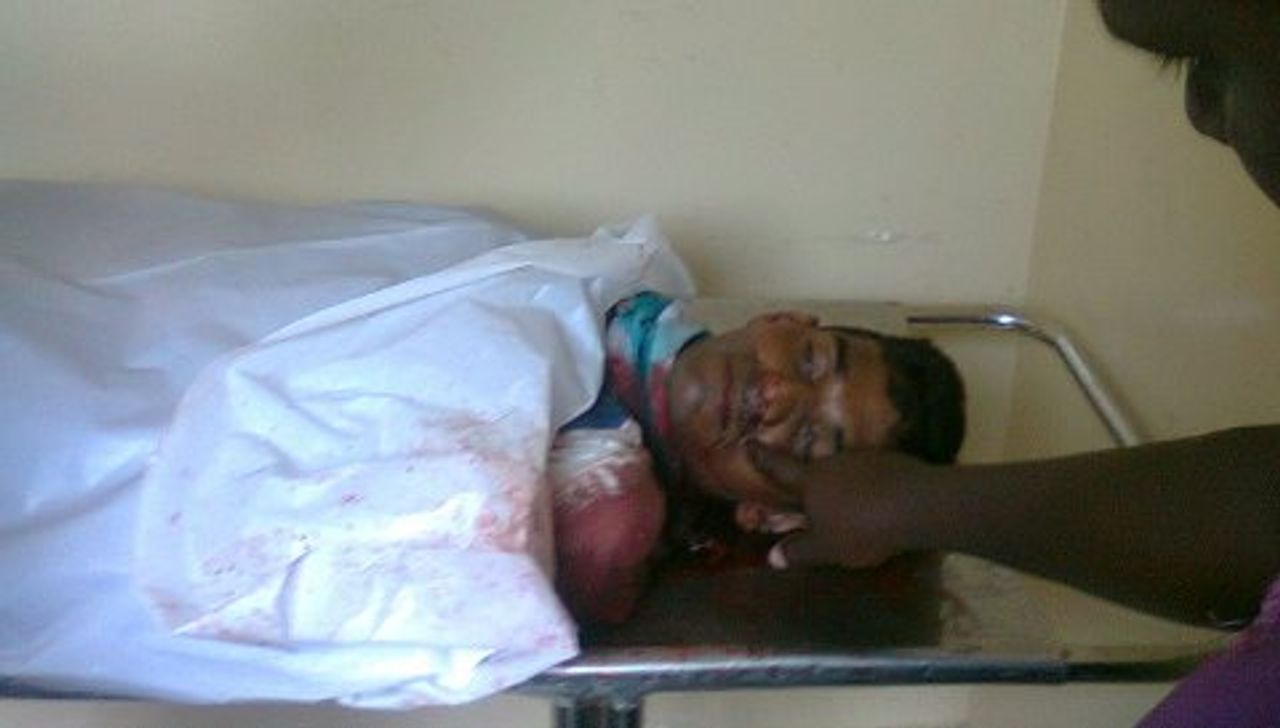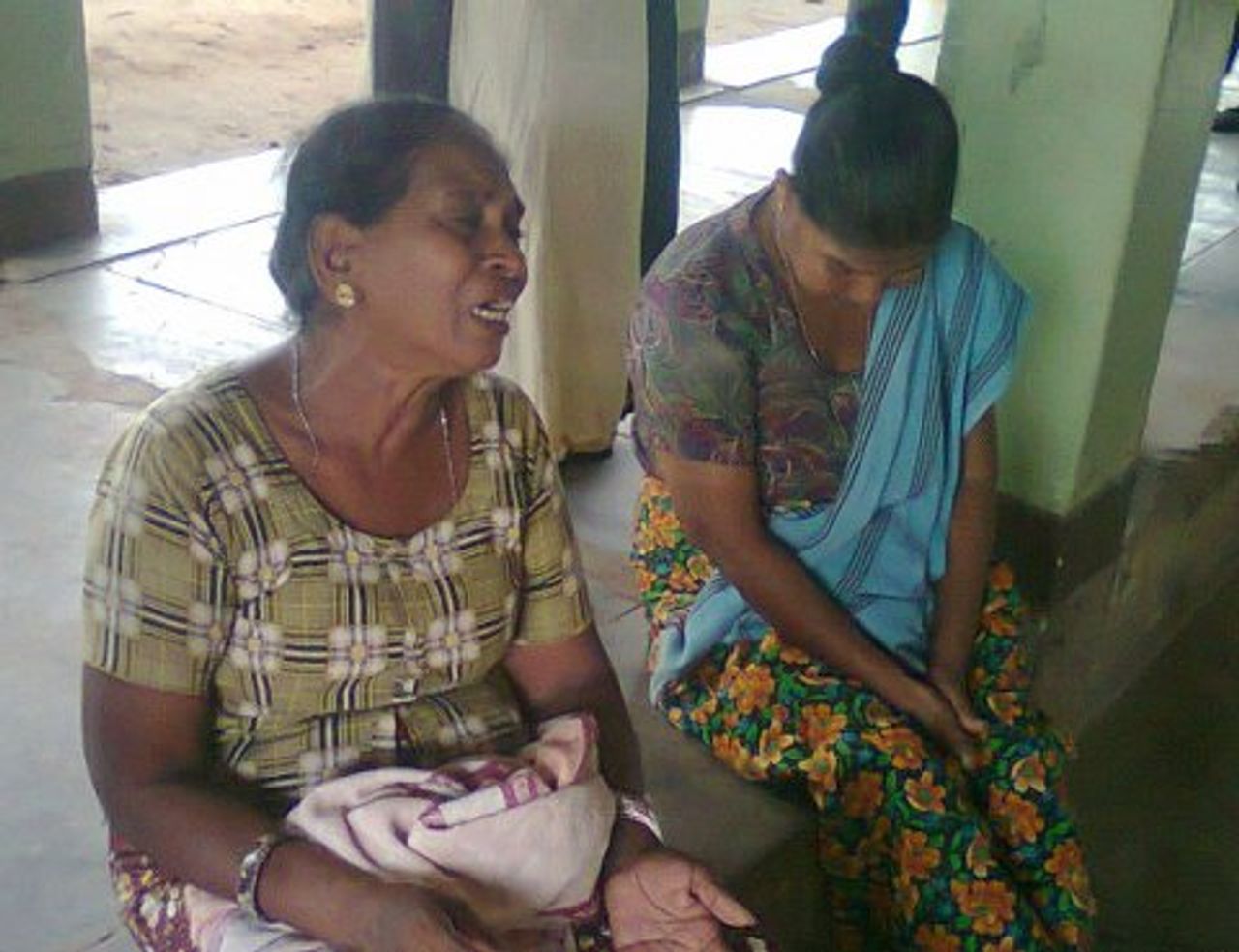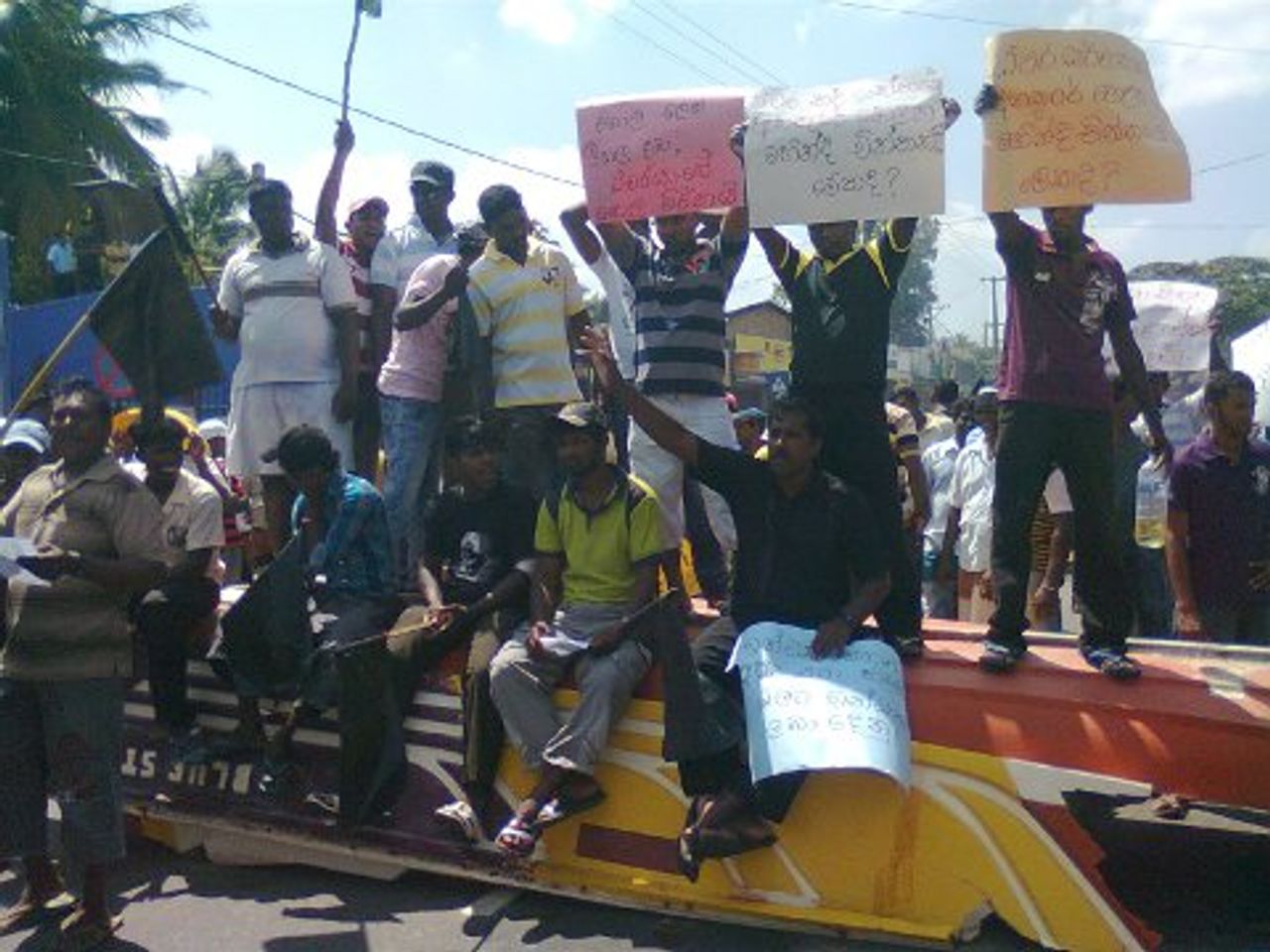One fisherman was killed yesterday, and three others were wounded, when police deployed by the Sri Lankan government fired at protesting fishermen at Chilaw-Wella in the country’s north-western province.
Fishermen were protesting for the third day against fuel price increases of up to 50 percent announced by the government on Saturday as part of an International Monetary Fund-imposed austerity package. Fearing more demonstrations, the police imposed a curfew in the area from Wednesday evening to this morning.
Antony Warnakulasuriya, 35, a father of two, died on the spot with a gunshot injury. A bullet had passed through his face, under his nose. Selastian Regan was injured in the chest and transferred to Colombo national hospital in a critical condition. A third protester was injured in one of his knees, and another lost three fingers when he tried to avoid a tear gas canister.
 Warnakulasuriya's body in Chilaw hospital
Warnakulasuriya's body in Chilaw hospitalAfter the police and the army had prohibited fishermen from protesting in the town on Tuesday, more than 4,000 people gathered yesterday morning at Chilaw-Wella church. They rejected a meagre price subsidy announced by the government on Tuesday and demanded the withdrawal of the price increases.
Catholic priests tried to stop the fishermen from protesting, saying they were in discussions with the government about securing an 80 percent subsidy. Fishermen shouted that all such pledges by the government in the past had proved to be bogus.
Once the fishermen started a march, walking about 500 metres toward Chilaw town, police fired tear gas and special police force (STF) officers fired with live bullets without any warning. The police would not let the injured be taken to hospital, forcing people to evacuate them in boats via a nearby lagoon.
Tensions are running high in Chilaw-Wella. About 15,000 fishermen and family members gathered there last night after hearing of Warnakulasuriya’s death. Priests stepped in, however, pleading with them not to march to the town. The government sent more police, STF and army contingents to Chilaw. By last night, the town and surrounding area looked like a war zone.
Earlier, police tried to take Warnakulasuriya’s body to Colombo but people refused to allow this. Facing opposition, the provincial council fisheries minister, Sanath Nishantha, had to withdraw from the hospital.
The police shooting was a calculated attack, ordered by President Mahinda Rajapakse’s government. It was intended to send the message that the government will not tolerate any opposition to the implementation of the IMF-dictated measures.
The raising of diesel and kerosene prices by 37 and 50 percent will devastate poorer sections of the population, including fishermen, who use improvised mechanised boats for fishing.
Other IMF conditions require devaluation of the rupee, higher electricity tariffs, the slashing of the budget deficit and a credit squeeze. Each of these measures will severely affect the living standards of workers and the poor.
The government has already begun imposing these attacks, in preparation for signing a new agreement with the IMF to obtain the final instalments, totalling $US800 million, of a previously agreed IMF loan.
The government initially took the loan in 2009 amid a balance of payments crisis following the long communal war against the separatist Liberation Tigers of Tamil Eelam (LTTE). Now confronted with the intensifying European and world financial crisis, the government is acutely nervous about any resistance to its policies by workers, poor and youth.
 Warnakulasuriya's mother
Warnakulasuriya's motherSpeaking to WSWS reporters, one of Warnakulasuriya’s relatives said: “It is the government that has ordered the police to shoot. We launched the agitation peacefully. The police forces fired while stretched out on the ground, as in a war.” He condemned the government. “They increased the prices of fuel and do these crimes against us. We have a right to agitate. We should not allow this kind of criminal act.”
The relative said Warnakulauriya’s wife had left for Saudi Arabia to seek work only last month because the family could not earn a living from fishing. “Their children are going to school. Who will look after them?” he asked.
Thousands of fishermen and their families have protested during the past three days, particularly across the country’s north-western coastal belt, demanding the withdrawal of the price hikes. As the protests spread to some areas in the south, the government sought to deflect the anger by announcing a subsidy of 12 rupees (10 US cents) for diesel and 25 rupees for kerosene, even though the increases were 31 and 35 rupees respectively. The government is notorious for breaking such pledges, however.
A WSWS reporting team visited several areas in the north-west to speak to protesting fishing families. A fisherman’s wife at Mahawewa said: “The government promises on subsidies are false. They might give us something and then later cut it all. What we need is the reduction of the prices of fuel and other goods. High prices for fuel mean higher prices for all other goods.”
 Mahawewa protesters
Mahawewa protestersShe explained that because of the lack of refrigeration facilities, most fishermen were forced to sell their catches for a pittance. Because of unaffordable fuel prices, some fishermen had already shifted to unpowered boats.
“Without modern facilities you can’t do this job,” she said. “However, there is no government scheme to provide those facilities for us. We survive on the aid of fisheries associations and SEDEC (a church-controlled welfare organisation). I owe 250,000 rupees ($US2,090) for a loan I got from SEDEC.”
Another fisherman commented: “When there was war, the government promised to give us relief after concluding it. Where is that relief? We were promised we could fish anywhere in the sea after the war. Now we are prohibited even go to Kalpitya [a nearby fishing area]. That area is being developed as a ‘tourist paradise’.”
One person said he had voted for the government. Earlier he had voted for the opposition Janatha Vimukthi Peramuna (JVP), before it joined a previous coalition government. “No one did anything for our betterment,” he remarked. “We need a new kind of a government.”
Right-wing United National Party parliamentarians and local leaders of the People’s Struggle Movement (PSM), a recent JVP breakaway, sought to exploit and divert the anger at Mahawewa. The local fishermen’s union president, a PSM member, said: “We don’t want to overthrow the government. We cannot do that. We are just protesting.”
However, the long accumulating problems of fishermen have only worsened under one capitalist government after another. This economic system has no solutions for workers and the rural poor, just deeper attacks and repression. Fishermen can defend and improve their conditions only through the fight for a workers’ and peasants’ government that will implement socialist policies, overturning the profit system and re-organising the economy for the betterment of working people.
In this struggle, the Socialist Equality Party (SEP) calls on all sections of the working class to come to the defence of fishermen now targeted by the Rajapakse government.
The author also recommends:
Protests erupt as Sri Lankan government enforces new IMF austerity measures
[15 February 2012]
